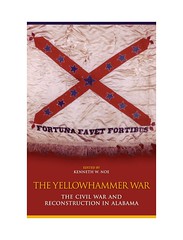Top Civil War scholars to speak at Auburn University as part of sesquicentennial commemoration
Article body
The state of Alabama's role in the Civil War and its aftermath will be the focus of a free, public symposium at Auburn University.
"The Yellowhammer War: A Civil War Symposium" will be held Saturday, Sept. 13, beginning at 8:30 a.m. in Langdon Hall on the Auburn University campus. Speakers will include contributors to the book, "The Yellowhammer War: The Civil War and Reconstruction in Alabama," which was published to mark the sesquicentennial of the Civil War and will be available for purchase at the event.
Edited by Auburn University professor of history Kenneth Noe, the book is a collection of essays covering topics including race, women, the home front and even Alabamians' reactions to the assassination of Abraham Lincoln.
Noe said the idea behind the book was to contact people researching Civil War and Reconstruction in Alabama today, and invite them to write on topics of their choosing.
"While each topic is interesting in and of itself, taken as a whole the essays really provide a snapshot of where Alabama Civil War studies are during the sesquicentennial," he said. "When we were considering titles, ‘The Yellowhammer War' seemed to be a very appropriate name for a book about the war and reconstruction in the Yellowhammers' state."
"Yellowhammer" was a nickname for Alabama Confederate soldiers.
"During the first winter of the war, a company of Alabama cavalrymen showed up in camp wearing brand new uniforms trimmed in regulation cavalry yellow," Noe explained. "Some of the veterans already in camp, dressed in their tattered clothing, teased the new arrivals about looking like yellowhammer woodpeckers. After that, the name stuck."
The symposium will conclude with a walking tour of Civil War era Auburn led by faculty and graduate students from the Auburn University Department of History, beginning at 2:45 p.m.
"The war itself began in 1861, but really came home to Auburn in 1864 when Union troops came through," said Noe. "This is Auburn's chance to embrace the sesquicentennial and to mark our history from the 1860s and 1870s."
"Dr. Noe and the authors of ‘The Yellowhammer War' made a significant contribution to the state of Alabama with this new book, and we are pleased to have so many of these historians on campus for the symposium," said Mark Wilson, director of the Caroline Marshall Draughon Center for the Arts and Humanities. "The walking tour of Auburn sites will be a special treat, especially for those who will be visiting campus for the first time."
In addition to the symposium, Special Collections and Archives of Auburn University Libraries is currently featuring its collection of Civil War documents related to the Hampton Roads peace conference, which took place in February 1865. The exhibit in Ralph Brown Draughon Library will be open from 9 a.m. to 1 p.m. the day of the symposium and 1-9 p.m. the following day.
When the Hampton Roads Conference was convened, it was agreed that no formal notes would be kept of the proceedings. Therefore, the private papers of Hampton Roads Conference attendees, such as U.S. Major Thomas Eckert and Confederate Assistant Secretary of War John A. Campbell, have become extremely important in understanding why the Hampton Roads negotiations ultimately failed.
For the complete schedule, list of presenters and other symposium details, go to http://www.cla.auburn.edu/cah/programs/yellowhammerwar/.
The event is sponsored by the Department of History and the Caroline Marshall Draughon Center for the Arts and Humanities, both in the College of Liberal Arts at Auburn University.
Related Media
Media interested in this story can contact Communications Director Preston Sparks at (334) 844-9999 or preston.sparks@auburn.edu.
Auburn University is a nationally ranked land grant institution recognized for its commitment to world-class scholarship, interdisciplinary research with an elite, top-tier Carnegie R1 classification, life-changing outreach with Carnegie’s Community Engagement designation and an undergraduate education experience second to none. Auburn is home to more than 30,000 students, and its faculty and research partners collaborate to develop and deliver meaningful scholarship, science and technology-based advancements that meet pressing regional, national and global needs. Auburn’s commitment to active student engagement, professional success and public/private partnership drives a growing reputation for outreach and extension that delivers broad economic, health and societal impact.





